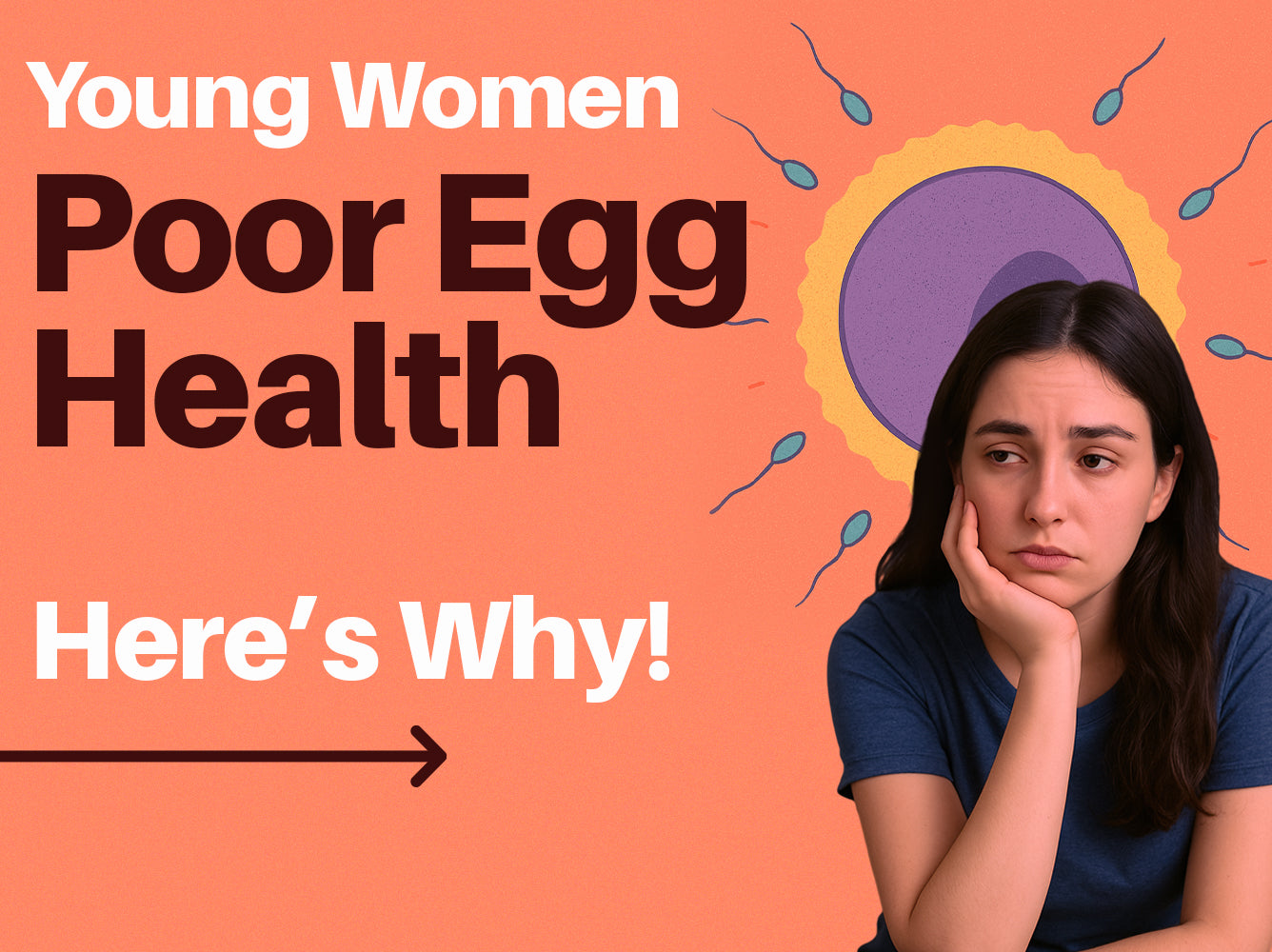Fertility isn't just about numbers — it's about the right conditions coming together at the right time.
If you're trying to conceive naturally, one important factor to understand is egg size.
In this guide, you’ll learn:
- What is the ideal egg size for natural conception,
- How egg size affects your chances of getting pregnant,
- Common reasons for small egg size,
- And easy, natural tips to support healthy egg growth.
What is the Minimum Egg Size to Get Pregnant Naturally?
In natural conception, an egg (ovum) ideally needs to be between 18 mm and 24 mm in size to be considered as mature enough for successful fertilization.
-
Less than 14 mm: Generally considered immature and unlikely to result in pregnancy.
-
18 mm to 24 mm: Optimal size — indicates the egg is ready for ovulation and fertilization.
-
Above 24 mm: The egg might be overripe, which can lower its quality and chances of fertilization.
Pro Tip:
Most women ovulate when the follicle (the fluid-filled sac containing the egg) measures around 18–22 mm.
That’s why timing intercourse around this window can dramatically improve your chances of natural conception.
Why Egg Size Matters for Natural Conception?
Egg size is a strong indicator of egg maturity — a crucial factor for successful pregnancy.
Here’s why the right egg size matters:
-
Mature eggs have completed important chromosomal divisions (meiosis), ensuring healthy genetic material.
-
They have enough energy reserves like mitochondria, to survive fertilization and early embryo development.
-
They produce stronger, healthier embryos, leading to better implantation chances in the uterus.
Result:
Higher probability of pregnancy & lower risk of miscarriage.
On the other hand, if an egg is too small or underdeveloped, it may not even release from the follicle properly — leading to an anovulatory cycle (no ovulation).
What Happens if Egg Size is Smaller than 18 mm?
If your follicles are smaller than 18 mm during ovulation, several things could happen:
- The egg may not be mature enough for successful fertilization.
- Ovulation may be weak or absent, meaning the egg might not be released properly.
- Even if fertilization occurs, embryo quality might be poor, reducing chances of implantation.
- The risk of early miscarriage can increase.
Important to know:
Sometimes follicles continue growing even after your ultrasound check.
That’s why doctors often track follicle growth over several days to find the best timing for natural conception or IUI (Intrauterine Insemination).
Factors That Influence Egg Growth and Size!
Several factors can affect follicle development and egg size:
-
Hormonal Imbalances: Issues with FSH (Follicle Stimulating Hormone), LH (Luteinizing Hormone), or estrogen can disrupt egg growth.
-
Age: After 35, both egg quality and the speed of follicle growth decline naturally.
-
Polycystic Ovary Syndrome (PCOS): Women with PCOS often have many small follicles that struggle to mature properly.
-
Stress and Lifestyle: Chronic stress, smoking, poor diet, and lack of sleep can interfere with hormonal rhythms that support healthy ovulation.
-
Low Ovarian Reserve: Women with a lower egg count may experience irregular or poor-quality follicle development.
-
Thyroid Disorders: Both hypothyroidism & hyperthyroidism can disrupt the normal hormonal environment needed for egg growth.
How Follicle Growth Progresses During a Natural Cycle?
-
Day 2–5 of the cycle:
Baseline scan shows resting follicles (antral follicles) around 2–6 mm.
-
Day 6–10:
A dominant follicle emerges and starts growing faster than others.
-
Day 11–14:
The dominant follicle reaches 18–24 mm, signaling maturity and readiness for ovulation.
-
Ovulation:
Triggered naturally or by an LH surge when the follicle is in the ideal size range.
Interesting Fact: Follicles generally grow 1–2 mm per day during the later part of the cycle!
How to Naturally Improve Egg Growth and Quality?
The good news is that small changes in your lifestyle can make a big difference!
1. Eat a Fertility-Boosting Diet
Focus on foods that nourish your eggs:
-
Leafy greens (rich in folate)
-
Nuts and seeds (omega-3s and zinc)
-
Colorful fruits and vegetables (antioxidants)
-
Whole grains (stable energy levels)
Avoid:
Processed foods, excess sugar, alcohol, and trans fats, as they contribute to inflammation & hormonal imbalances.
2. Manage Stress
High stress levels push your body to produce cortisol, which can interfere with reproductive hormones.
Simple stress-busters:
-
Yoga or gentle stretching
-
Daily 10-minute meditation
-
Journaling or mindful breathing
-
Nature walks
Remember:
Your emotional health directly influences your fertility health.
3. Maintain a Healthy Body Weight
-
Being underweight (BMI below 18) can delay ovulation.
-
Being overweight (BMI above 30) can lead to hormonal resistance (especially insulin), affecting egg growth.
Aim for a balanced BMI between 19–24 for optimal natural fertility.
4. Support Egg Health with Supplements
Certain fertility supplements have shown promise:
-
CoQ10: Boosts mitochondrial energy in eggs.
-
Myo-Inositol: Especially helpful for women with PCOS.
-
Vitamin D: Supports hormonal balance.
-
Omega-3s: Reduce inflammation and promote better blood flow to ovaries.
5. Get Quality Sleep
Sleep impacts every hormone cycle in your body.
Aim for:
-
7–8 hours of restful, uninterrupted sleep each night.
-
Sleeping in a dark, cool room to boost natural melatonin — a hormone linked to better egg quality!
In Summary: Focus on Egg Size and Overall Egg Health — for Natural Pregnancy Success
The minimum ideal egg size for natural pregnancy is around 18–24 mm at ovulation.
However, conception success depends not just on size — but also on egg quality, hormonal health, and lifestyle factors.
If you are tracking your ovulation & concerned about your egg size or fertility, early consultation with a fertility specialist can provide guidance. At SEED.FIT, we offer free consultations to help clear all your doubts and provide personalized advice on boosting your fertility journey.
Even small improvements in diet, sleep, stress levels and supplementation can significantly enhance your chances of conceiving naturally.
Stay patient, stay hopeful — your body can surprise you with its natural potential!


